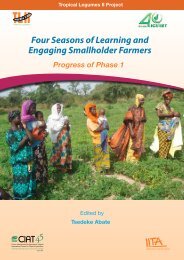ICRISAT Archival Report 2006 - The seedlings of success in the ...
ICRISAT Archival Report 2006 - The seedlings of success in the ...
ICRISAT Archival Report 2006 - The seedlings of success in the ...
You also want an ePaper? Increase the reach of your titles
YUMPU automatically turns print PDFs into web optimized ePapers that Google loves.
Activity A.6.5: Develop strategy for better documentation <strong>of</strong> germplasm accessions at Sadore genebank<br />
Milestone A.6.5.1: Strategic plan for documentation <strong>of</strong> germplasm developed and implemented (BH, 2008)<br />
Output target A.7: Unrestricted access and movement for staple crops germplasm ensured (2009)<br />
Activity A.7.1: Assure risk-free export and import <strong>of</strong> germplasm materials<br />
Milestone A.7.1.1: Requested germplasm <strong>of</strong> staple crops distributed to bona fide users for utilization<br />
(RPT/HDU/NBPGR/BH/MGM, Annual)<br />
Dur<strong>in</strong>g this year, we distributed a total <strong>of</strong> 8516 samples <strong>of</strong> staple crops germplasm (sorghum-1806; pearl millet-<br />
1261; chickpea-2847; pigeonpea-1308; and groundnut-1294) for utilization to scientists <strong>in</strong> 23 countries <strong>in</strong> 111<br />
consignments follow<strong>in</strong>g standard protocols. Some <strong>of</strong> <strong>the</strong> special requests <strong>in</strong>clude sets <strong>of</strong> germplasm for<br />
collaborative evaluation with NARS <strong>in</strong> India and o<strong>the</strong>r countries (Table 1). <strong>The</strong> details are as follows:<br />
Table 1. Distribution <strong>of</strong> germplasm sets for utilization dur<strong>in</strong>g <strong>the</strong> year <strong>2006</strong>.<br />
Crop Nature <strong>of</strong> set No. Locations Countries<br />
Chickpea M<strong>in</strong>i core 4 India (3) and Mexico (1)<br />
Groundnut M<strong>in</strong>i core 6 India (4), Ch<strong>in</strong>a (1) and Malawi (1)<br />
Pearl millet Core 6 India (5) and Niamey (1)<br />
Pigeonpea M<strong>in</strong>i core 7 India (6) and UAE (1)<br />
Additionally, we provided 14206 samples <strong>of</strong> germplasm for <strong>in</strong>ternal utilization. <strong>The</strong> total <strong>in</strong>cludes, sorghum-<br />
3520; pearl millet-1647; chickpea-2915; pigeonpea-1986; and groundnut-4138.<br />
RP Thakur, HD Upadhyaya and NBPGR<br />
A total <strong>of</strong> 429 samples <strong>of</strong> 203 sorghum varieties were provided to n<strong>in</strong>e ESA countries namely Tanzania, Kenya,<br />
Uganda, Ethiopia, South Africa, Botswana, Zimbabwe, Mozambique and Malawi and also to Mali. For pearl<br />
millet a total <strong>of</strong> 192 samples <strong>of</strong> 48 varieties were provided to Kenya, South Africa and Sudan.<br />
MA Mgonja, E Manyasa and E Muange<br />
Milestone A.7.1.2: Requested germplasm <strong>of</strong> staple crops exported for utilization and new germplasm imported<br />
for conservation after seed health evaluation and clearance through NBPGR (RPT/HDU/NBPGR, Annual)<br />
Export <strong>of</strong> germplasm <strong>of</strong> mandate crops: We processed and <strong>success</strong>fully exported 9077 seed samples<br />
(sorghum 2329, pearl millet 1462, chickpea 4042, pigeon pea 393 and groundnut 851) compris<strong>in</strong>g <strong>of</strong> breed<strong>in</strong>g<br />
l<strong>in</strong>es and germplasm accessions to 40 countries under 141 phytosanitory certificates. Two hundred forty-one<br />
seed samples (sorghum 31, pearl millet 60, chickpea 117, pigeonpea 30, groundnut 2 and m<strong>in</strong>or millet 1) were<br />
rejected due to poor germ<strong>in</strong>ation and/or association <strong>of</strong> seedborne fungi (Exserohilum turcicum, Bipolaris<br />
setariae, Colletotrichum gram<strong>in</strong>icola, Fusarium oxysporum f.sp. ciceri, Botryodiplodia <strong>the</strong>obromae, Rhizoctonia<br />
bataticola and R. solani), non-established FAO designated status <strong>of</strong> <strong>the</strong> samples, or bacterium-contam<strong>in</strong>ated<br />
seed. Dur<strong>in</strong>g <strong>2006</strong>, 85.8% more seed samples were exported than <strong>in</strong> 2005.<br />
Bulk export <strong>of</strong> seed material: A bulk consignment <strong>of</strong> 435kg seed <strong>of</strong> four sweet sorghum varieties (SPV 422,<br />
ICSV 700, ICSV 93046 and ICSR 93046) was exported to Philipp<strong>in</strong>es and 7.5kg seed <strong>of</strong> Ber (Ziziphus<br />
rotundifolia) to Niger. <strong>The</strong> phytosanitory clearance for <strong>the</strong>se consignments was obta<strong>in</strong>ed from <strong>the</strong> Directorate <strong>of</strong><br />
Plant Protection, Quarant<strong>in</strong>e and Storage (DPPQS), Hyderabad.<br />
Import <strong>of</strong> germplasm <strong>of</strong> staple crops: We imported 2674 germplasm samples <strong>of</strong>: sorghum (483) from Niger,<br />
chickpea (1549) from Australia, Syria and USA, groundnut (634) from Japan, USA and Vietnam and Maize (8)<br />
from Italy. In addition, 324 maize accessions and 10 sorghum accessions imported by SM Sehgal Foundation<br />
from Egypt were planted <strong>in</strong> PEQIA for <strong>in</strong>spection and release by NBPGR.<br />
Import <strong>of</strong> non-mandate crops’ gra<strong>in</strong> and plant samples: Through special import permit obta<strong>in</strong>ed from<br />
Directorate <strong>of</strong> Plant Protection, Quarant<strong>in</strong>e and Storage (DPPQS), Faridabad we imported 800 dried and<br />
powdered samples <strong>of</strong>: maize stover (500) from Germany, wheat straw (100), wheat gra<strong>in</strong>s (100), Bersime<br />
49

















